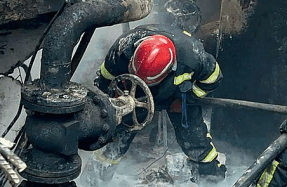A change of heart



Shards of electricity burned through Mr P’s flesh. Layers upon layers of subcutaneous fat unravelled, filling the operating room with a pungent, metallic odour, like singed hair at the neighbourhood barbecue. Within a few minutes, the pearly white bone of the sternum stuck out before a vein split open, filling the operative field with blood. Zap! Maroon juice turned into a crackly black mass.
Transplant surgery is all about timing, said Dr Brandon Guenthart, a cardiothoracic surgeon at Stanford University School of Medicine. Anaesthesiologists put the patient to sleep after the retrieval team confirms the donor heart looks good. Two surgeons start operating an hour before the donor heart arrives in the hospital. They don’t begin cutting the patient’s heart out until the donor heart has landed safely at the local airport.
And if the plane crashes? “Knock on wood,” said Guenthart. There’s unfortunately no wood in the operating room.
I was at Stanford hospital in California watching this heart transplant because of my interest in David Bennett, a 57-year-old man who had died back in March. On 7 January 2022, at the University of Maryland Medical Center, Bennett had received a landmark heart transplant from an unusual donor: a genetically modified pig.
In 2021, a record 41,354 human-to-human organ transplants were performed in the US, but over 100,000 Americans are still stuck on the transplant list. Every day, 17 people die waiting because there simply aren’t enough organs to go around. Xenotransplantation – or transferring cells, tissues and organs between species – promises to solve this shortage and to reshape how we think about human longevity.
Lost in this boundless potential, however, is the significance of the human-animal divide. People walking around with pig organs melded into their bodies – human-animal cyborgs of sorts – can seem dystopian. And with the zoonotic S ars-CoV-2 virus having killed more than 6 million people, violating the interface between humans and animals may just promise more catastrophe.
This tortuous relationship is nothing new, but it’s often sanitised and hidden from sight – think grinning cows on milk cartons and secret bunkers for animal research. Left open is a whole host of questions, starting with the most complex of all: what does it mean to be human?
HUMANS ARE ANIMALS. BUT ANIMALS ARE NOT HUMANS. And yet, our history is rife with
You’re reading a preview, subscribe to read more.
Start your free 30 days



